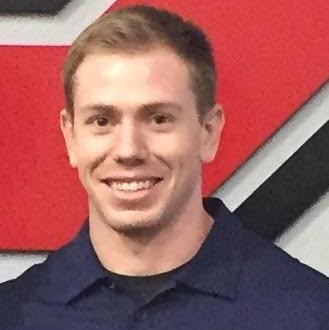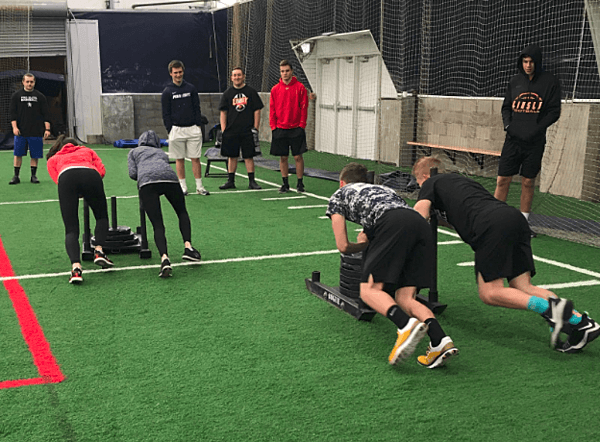Building Better Athletes from the Inside Out Part 2: Implementing Youth Sports Psychology
MindsetABOUT THE AUTHOR

RYAN LEIBREICH
Ryan is the Director of strength and conditioning at Pro Performance RX In Morgantown, West Virginia. Ryan has been working in the private sector with hundreds of youth athletes for the last 5 years. He is always excited to talk training and dig deep into the Why. Never stop learning, growing and adapting. In the great words of Bruce Lee be like water. To connect further with Ryan reach out to [email protected]
In part 1 of this series, we discussed building better athletes from the inside out by focusing on creating a great environment, weekly programming, and daily application.
Part 2 of this article series focuses on the implementation of team challenges and finisher exercises to aid in not only developing better athletes physically but also (more importantly) developing them mentally.
- Team Challenges build team cohesion and camaraderie while also building conditioning
- Finishers improve individual mental resilience and grit
We will also introduce how we break down the challenges by section / desired response and put it together into a schedule so you can see the overall implementation and layout.
// building mental toughness in your athletes
Mental toughness, grit, drive – these words get most coaches going. They are the part of the program people typically want to see. Athletes grinding it out, dripping sweat, breathing heavy.
Challenges should vary from physical to mental with a thought provoking scenario. With challenge games we see how athletes respond to adversity. Was the ball out? Did you catch it? Honesty. Watching and observing these games can give us natural insights into the habits, tendencies, and characteristics of athletes – how they carry themselves and the behaviors they display. This adds to the opportunity to have one-on-one player’s meetings to go over the things we picked up from the games.

We typically add in the challenges and finishers to our programming in 3 ways by asking ourselves what response we want from our athletes:
- Mental resilience = Individual finisher: Typically something very hard that athletes have to grind through and be reliant on themselves
- Camaraderie = Team task: You must rely on others to complete the task
- Critical thinking and reaction to adversity = Team game/puzzle: These are games where we have fun and hold ourselves and others accountable
// Things to Consider

Here’s a short list of factors to contemplate when incorporating challenges and finishers into your programming. These factors affect what you get out of your athletes and their psychology during each training session.
- Personalities
- Mental readiness
- Self-esteem
- Various social situations
- Fun
- Novelty
- Commitment
- Cost = loss aversion
- Buy in and understanding
We can vary our training and match certain components to get the best responses out of our athletes. Different personalities respond differently to types of stress placed upon them.
Start where they are and not where you want them to be. Players will evolve over time. I have seen those who challenge themselves everyday become more resilient and develop grit.
The same holds true with teams who start with small challenges. As those challenges become progressively harder, you will see the flashes of camaraderie developing. Then before you know it, you have a team of leaders who hold each other accountable. As the coach, you set the environment and standards and hold them to it. I believe this to be universal between all athletes and sports.
This was just a brief snapshot of the basics of what we do with our athletes. As stated before, there are many more components to the psychology of sport and it can get extremely complicated.
// Implementation
This is where the rubber meets the road. We can talk all day about theory, but the implementation is what truly sets us apart.
Your Title Goes Here
Your content goes here. Edit or remove this text inline or in the module Content settings. You can also style every aspect of this content in the module Design settings and even apply custom CSS to this text in the module Advanced settings.
Training Day 1
- Team Meeting: Define goals of that week (5 minutes)
- Daily Session Overview: Evaluate energy, explain tasks/lifts (5 minutes)
- Training Session (45 minutes)
- Psychological component = Mental resilience
- Individual finisher: Modify finisher or exercises to the players present and their mood, while still staying in the physiological range we want for the block that we are in.
-
EXAMPLE- Sled pushes for time. We do this like the beep test, hit this line in this predetermined time. Last man standing wins. Sled weight matches bodyweight. Athletes have to really focus and power through. NO one is helping you, just you and the burn in your legs. The athletes really have to dig deep and continue to push because they are capable of more, but they have to be mentally resilient and believe it. Pros of this finisher are it is easy to implement set and rest times to hit the energy system you want. Sleds are mostly a concentric exercise so they produce minimal residual soreness.
- Session evaluation: Recap of session and expectations (5 minutes)
Training Day 2
- Recap of yesterday + Daily session overview (5 minutes)
- Training Session (50 minutes)
- Psychological component = Camaraderie
- Team tasks where you must rely on others to complete
-
EXAMPLE- the large, awkward object carry. We can never do this one alone. Typically I find or create a large object for teams to carry and move from point A to point B for time. Goal is to be the fastest team to complete the task. We use sleds, 300 plus pound sandbags, half racks, you name it. The athletes must rely on each other and find ways to work together to get the task completed efficiently. Bonus- they are going to be really good at helping their friends and family move.
- Recap of session (5 minutes)
Training Day 3
- Recap of yesterday + Daily session overview (5 minutes)
- Training Session (35 minutes)
- Game (15 minutes)
- Psychological component – Adversity/Critical Thinking
- Tactical and physical demanding game
-
EXAMPLE- Capture the flag. No one said the challenges were not allowed to be fun. Capture the flag is straightforward. One object on one end of the field and one on the other. Capture the other team’s item without being tagged and you win. Depending on space you can change the rules. We are lucky enough to have a large turf field, but I have also played in a small gym. We clean everything up and set ground rules. Obstacles and safe zones are fun and bring an added element to the game. I am always surprised by which athletes really step forward to take initiative on the strategy as well and how hard everyone plays. My athletes are always running, dodging and moving. The game really has a great reactive agility component to it.
- Weekly review and expectations ( 5 minutes)
// Final Thoughts
Little moments matter! They can have a huge impact. There have been numerous times I have mentioned something in passing and later (we are talking months and sometimes years later) someone will bring up the fact that what I said to them made a significant impact. These are pivot points.
These challenges and finishers provide opportunities to learn, to grow, and to provide change. So when it matters most, your athletes have practiced these skills and faced adversity. When game time comes both in sports and life, these individuals will be better skilled to take on the challenges and pass with flying colors.
Are you a better coach after reading this?
More coaches and athletes than ever are reading the TrainHeroic blog, and it’s our mission to support them with usefull training & coaching content. If you found this article useful, please take a moment to share it on social media, engage with the author, and link to this article on your own blog or any forums you post on.
Be Your Best,
TrainHeroic Content Team
HEROIC SOCIAL
HEROIC SOCIAL
TRAINING LAB
Access the latest articles, reviews, and case studies from the top strength and conditioning minds in the TH Training Lab

